Successful cricket seminar at Bath CC
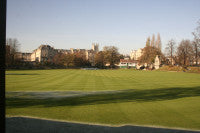 Bath CC club, in co-operation with the STRI and four sports turf contractors/suppliers, held a successful cricket seminar with the aim of bringing together both the scientific and practical approaches to maintaining and managing cricket pitches.
Bath CC club, in co-operation with the STRI and four sports turf contractors/suppliers, held a successful cricket seminar with the aim of bringing together both the scientific and practical approaches to maintaining and managing cricket pitches.
The audience of Groundsmen representing clubs from all parts of the South West of England were treated to full day of seminars and practical demonstrations.
First up was John Lockyer MSc, STRI Regional Turfgrass Agronomist - Central/Southern England and Spain, who began the day explaining the STRI's new ASHES Service that enables cricket clubs to be more aware of the physical soil make up of their playing surfaces in particular the square.
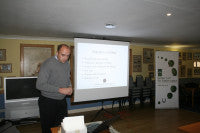
It involves the taking of a number of soil core samples from the playing pitch to ascertain the condition of the soil profile, assess soil strength, rooting depth and composition (% clay content) and type.
The service is based on the following programme:-
· Site visit: pre and/or in season
· Soil test for benchmarking (optional)
· Square analysis and core evaluation
· Sample taking and processing
· Feedback of results
· Ongoing testing if required
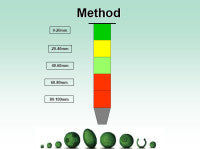

Once the soil data has been assessed a suitable programme of rolling and maintenance regimes can be initiated to maximise the potential of the club's pitches. The soil tests evaluate the soil profile in 20mm segments down to a depth of 100-mm. The soil is tested for soil bulk and moisture content. The results are compared to target soil bulk density and moisture statistics given for optimum playing performance of soil.
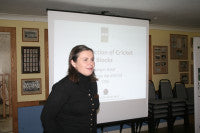 This information helps the Groundsman to have a better understanding of the condition of the soil profile and what is required to improve its performance in relation to maintaining and preparing a cricket wicket for play and, in particular, the amount of rolling and timing of rolling required.
This information helps the Groundsman to have a better understanding of the condition of the soil profile and what is required to improve its performance in relation to maintaining and preparing a cricket wicket for play and, in particular, the amount of rolling and timing of rolling required.
However, like most things it comes at a cost, anything from £300 to £800 depending on the type and number of tests undertaken. 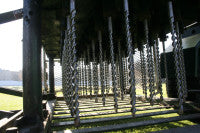
The message is really about taking up the opportunity to embrace a more scientific approach to the management of your sports facilities, particularly with reference to appropriate soil analysis and data recording of the condition of your facility at a given time or date.
Next speaker was Megan Hood B. Appl. Sci (Hons), STRI Regional Turfgrass Agronomist - North West & West Midlands, who gave an interesting insight into pitch constructions, with particular reference to stadium environments.
The talk included information about primary and secondary drainage, depths of clay profiles, choice of loams and over seeding rates for constructions. Megan also commented how Groundsmen were taking on board new ideas and are now using heavier rollers for consolidation 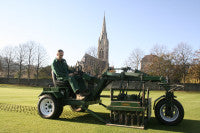 during pitch preparations with some Groundsmen using 3-5 tonne rollers.
during pitch preparations with some Groundsmen using 3-5 tonne rollers.
By now it was time for a break and then outside to see some demonstrations by three leading aeration companies who were on hand to discuss the merits and techniques of aeration for cricket grounds.
First up was Bretton King from Ecosol who was demonstrating his deep drill machine that has become very popular with cricket club groundsmen enabling them to sort out any deep-seated compaction problems. The machine can drill down to 300mm. Deep drilling and back filling with clay can help bind layers and at the same time relieve compaction at depth. The drill has been used this year at Trent Bridge to decompact some of their pitches.
David Meharg from Groundsman Industries was on hand to demonstrate the ever-popular Groundsman Spiker, a punch tine pedestrian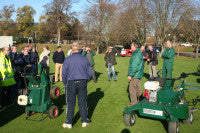 aerator that offers a range of chisel, solid and hollow tines. Also demonstrated was a small pedestrian compressed air single probe decompactor.
aerator that offers a range of chisel, solid and hollow tines. Also demonstrated was a small pedestrian compressed air single probe decompactor.
Alf Ganderton and Tony Brasier of Hereford contractors, Underbuster Ltd, demonstrated the Gwazae deep probe tractor-mounted aerator that utilises a compresses air system to decompact soil profiles. Air is delivered through a high performance compression system via the ground probe that is made of toughened steel. The depth of soil penetration can be varied between 300mm and 700mm, with even spacings of 1200mm to 2400mm.
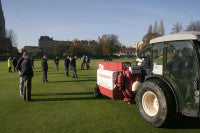

The Gwazae certainly made the earth move during its demonstration on the outfield. I am sure Gordon Gill, Bath's Groundsman, will be watching in anticipation to see the benefits from all these aeration demonstrations.
It was then back into the club house for launch and final presentations from David Goodjohn of GSB Loams and Steve Gingell from the STRI.
David dispelled some myths about loam soils during an interesting talk on where they originate, their make up, how they are sourced, processed, stored and delivered.
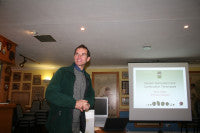
It was then left to Steve Gingell BSc (Hons), STRI Area Manager - Southern England and South Wales, to conclude the day with a talk on cricket pitch renovations and construction techniques, referring to the many new management tools now available to help maintain facilities more efficiently.
The advent of the Koro fraise mower and deep linear scarifiers have vastly improved the way we can renovate and repair playing surfaces. The opportunity to choose a wider range of products and specialist services has also been instrumental in improving the condition and performance of cricket facilities.
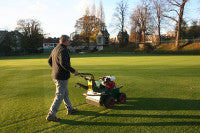 The concept of the cassette systems, whereby a single mower unit can now be complemented with thatch away reels, spiking and brushing units, certainly shows how far we have come in the modernisation of equipment for maintaining natural grass sports facilities.
The concept of the cassette systems, whereby a single mower unit can now be complemented with thatch away reels, spiking and brushing units, certainly shows how far we have come in the modernisation of equipment for maintaining natural grass sports facilities.
It was clearly visible by the condition of the ground at Bath CC that Gordon was up to date with the latest technologies and developments in turf management now on offer.
The presentation and quality of the sward promoted at Bath CC is a credit to the hard work and endeavour of Gordon, who like many Groundsmen have pride in their workmanship and only ever want to achieve the best with the resources they have available.
